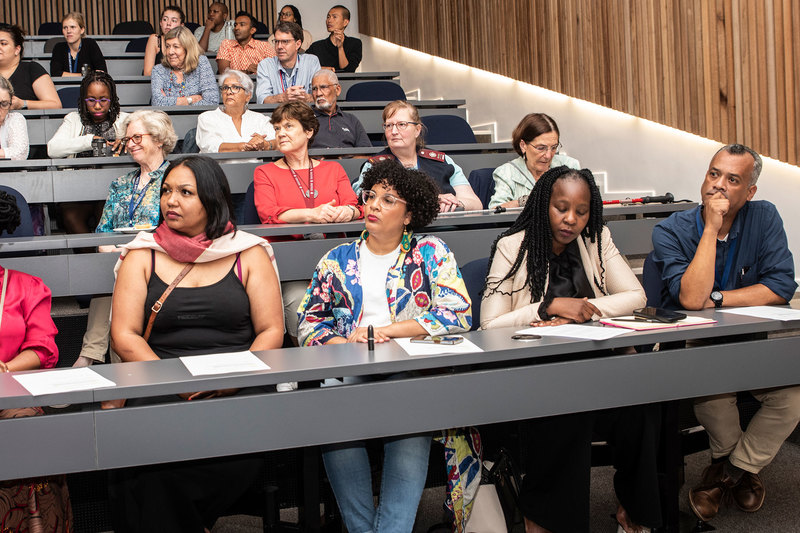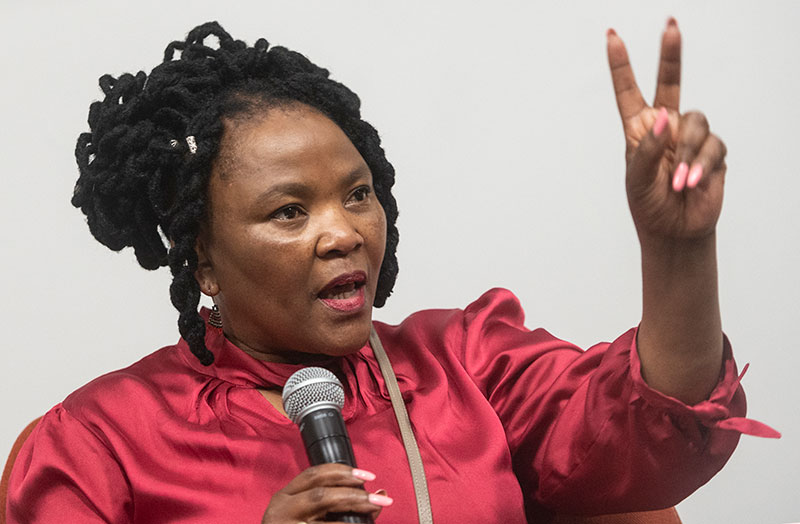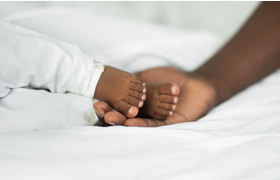Exploring the nexus of obstetric violence and mental ill-health
29 November 2023 | Story Stephen Langtry. Photos Brenton Geach. Read time 6 min.
To address the critical issues surrounding maternal health and mental well-being, the Perinatal Mental Health Project (PMHP) of the Alan J Flisher Centre for Public Mental Health, in collaboration with the University of Cape Town’s (UCT) Department of Obstetrics and Gynaecology, organised an event on 23 November. The event, the screening of a film titled No Maternal Health without Mental Health, together with a panel discussion, formed part of the Faculty of Health Sciences’ Transformation and Equity Committee’s “16 Days of Activism against Gender-Based Violence (GBV)” campaign.
Associate Professor Simone Honikman, the director of the PMHP, set the tone for the event. “One in three women in South Africa will experience depression and/or anxiety during pregnancy and the first year postpartum.” This, she added, is largely due to the many adversities that women face in society. “Many of these hardships are intimately associated with the profound and devastating intergenerational impact that apartheid continues to exert on our nation.”
Associate Professor Honikman said that there is a pervasive problem of mistreatment, disrespect and abuse that women experience during pregnancy, childbirth or the postpartum period. This is termed as “obstetric violence”, which is formally recognised by the United Nations as a form of GBV.
“The underlying causes include a lack of training and awareness – not only at the level of the frontline providers but also at the level of people who manage systems,” she said. Other causes include dysfunctional power dynamics, inadequate communication, resource constraints, and discrimination and bias. In 2021, the National Department of Health issued a new Maternal Health Policy, which includes respectful maternity care as a key objective.
The film screening itself served as a powerful catalyst for the ensuing dialogue. The film was produced to support training and capacity-building and it is open access, available on the PMHP YouTube site. It laid bare the challenges faced by women at the intersection of obstetric violence and mental ill-health – how women with psychosocial needs may be further marginalised when facing disrespect and abuse within the healthcare system and how this obstetric violence may worsen the emotional distress often experienced by women.
Perspectives
Guiding the panel discussion that followed the screening was obstetrician Professor Salome Maswime, the head of Global Surgery at UCT.

Among the panellists was Dr Nomafrench Mbombo, the Western Cape minister for health and wellness. She said: “We must understand that there are no health services without health workers. Therefore, we also have to consider and take care of them.”Dr Mbombo’s presence not only added a governmental perspective to the discussion but also signalled the importance of policy and guideline interventions in addressing the challenges faced by women in the perinatal period.
“I needed to be seen as a person sitting there. Not just a patient or a number.”
Jason Marcus, a senior lecturer in the Department of Obstetrics and Gynaecology at UCT, brought a wealth of academic expertise to the panel. “We can teach people the technical skills that they need to save lives,” he said, “but they also need the skills to manage themselves – to recognise I am not OK, to recognise that I’m not behaving OK.” Students are therefore also taught professional humility, to have compassion for themselves and, through this, compassion for their patients. He mentioned a concern with the South African midwifery training curriculum which is 40 years old and not transformed to the needs of women using the services today. He also spoke about the ‘hidden curriculum’, which refers to the importance of seniors’ role-modelling behaviours.
Shana Fife, an author and a woman with a lived experience of obstetric violence, brought a deeply personal dimension to the conversation. “It would have been small things that would have made that entire experience less abusive,” she said. Her experience included being left in hospital without food and medication for almost 24 hours after a caesarean section. “I needed to be seen as a person sitting there. Not just a patient or a number.”
Caring for the health workers
Liesl Hermanus, the clinical services coordinator at PMHP, added a vital perspective to the discussion by emphasising the importance of healthcare workers needing to feel cared for themselves. A straightforward interaction with staff, such as asking, “How are you doing? Have things been okay?” can become a pivotal moment. This informal, human point of contact can trigger a significant shift, enabling individuals to reflect on their own needs and, in turn, connect with the needs of their clients, Hermanus said. It doesn’t necessarily have to be a formal process; even simple gestures like managers or colleagues checking in or expressing acknowledgment can go a long way.
“It’s easy to normalise bad behaviour. Let’s focus on the leaders but let’s also focus on what we are showing the students who are seeing how to behave for the first time in the working world.”
In concluding the panel discussion, Professor Maswime said, “It’s easy to normalise bad behaviour. Let’s focus on the leaders but let’s also focus on what we are showing the students who are seeing how to behave for the first time in the working world.”
 This work is licensed under a Creative Commons Attribution-NoDerivatives 4.0 International License.
This work is licensed under a Creative Commons Attribution-NoDerivatives 4.0 International License.
Please view the republishing articles page for more information.










.JPG)